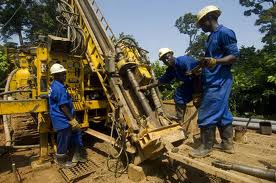Ghana is one of the world's top producers of gold, now mining more than five times as much as gold as it did in the early 1990's. With gold prices at record highs, more companies are rushing to Ghana for a piece of the action.
At the government's Minerals Commission in the capital city of Accra, director Joseph Aboagye, unfurls a huge map.
"We have a map showing all the concessions that have been granted in the country," he said.
Red and blue boxes on the map show where companies are looking for gold, green marks active mining. The gold-rich areas of Ghana are saturated with colors - they are covered in mining activity.
BOIKO-WEYRAUCH: "There are very few parts that are not covered it looks like."
ABOAGYE: "Yeah, that is true. But you can still see some open spaces."
Aboayge says in 2006, his government changed its mining laws to attract international investors.
"The old law was operated for about 20 years and then somewhere along the line we saw that we were not competitive, so we reviewed it," he said.
More than 220 companies are mining or looking for gold in Ghana, one of them is Newmont. The U.S.-based miner is the world's second largest gold company. Newmont has one surface mine in Ghana. Before it is done, almost half a billion tons of rocks will be blasted out of the ground.
It is a huge amount of work. For every three rocks that come out, only one of them has gold. All those rocks go somewhere.
Newmont had to relocate about 10,000 people to make way for its mine.
In one resettlement community, Ama Nokpeta feeds her toddler in front of the small yellow house Newmont moved her to four years ago. She says life is worse after the move.
She says Newmont made a lot of promises, including free water and electricity and jobs for their husbands. But she says none of the promises have been kept.
Newmont declined to comment for this story. But activists and community leaders on both sides have been vocal about the company's operations. Newmont has gotten a lot of attention for its plans to open another, equally large mine, northeast of Accra.
Martha Asamoah is cutting back weeds on her orange and palm-tree farm. Once the new mine is built, this place will be a reservoir for ore after the gold is extracted - mine waste.
Asamoah and the other farmers on this land will get compensation from Newmont. The company pays about $1,400 for an acre of palm trees. Martha says she can earn a little under that for an acre of palm trees each year, but she can keep earning it as long as the trees last - 25 years.
Asamoah says every year her crops grow bigger, so she earns more than the year before. She says that is why she does not want Newmont to come.
But many people are hopeful about the potential mine - they see new jobs and new development. The community leaders in the area have all spoken in support of the new project. At the government's Minerals Commission, Joseph Aboagye says the mining companies have been good for Ghana.
"They are contributing a lot to the local community," he said. "Some have been providing hospitals, roads, schools."
"Some place it help peoples," said Belinda Susu, who is frying fish and sweet potatoes by the side of the road near Newmont's proposed mine site. She says her business will improve when the mine opens, but she is also worried about the town's future, because some mine waste contains cyanide.
"I think we will have disease, the chemicals they will be using here will affect us," she said.
Newmont's current mine had a cyanide spill earlier this year, killing fish in a nearby river. The company says it was a small incident and has been cleaned up.
Newmont is waiting for the Ghanaian government to sign off on the new mine. The company says its new mine will produce as much gold as its current mine in Ahafo. Last year, that mine earned Newmont nearly almost $175 million.
Business News of Tuesday, 29 December 2009
Source: VOA
Ghanaians Caught in Gold Rush

















